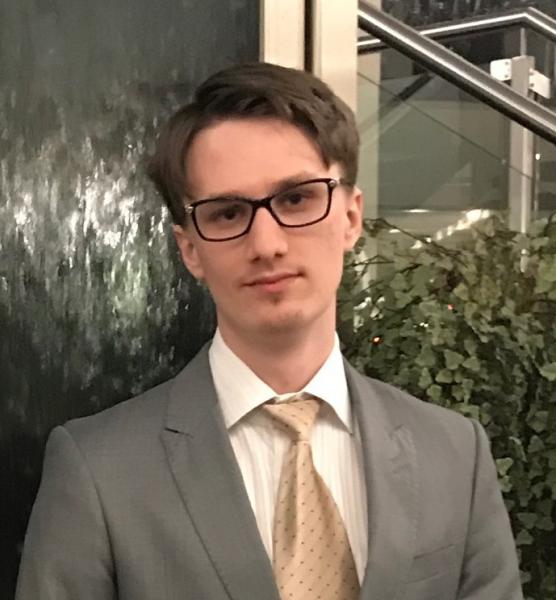
Zainab Mirza
Specialist: Biological Chemistry Co-op
Minor: Environmental Science
What factors contributed to you choosing your program(s)?
Chemistry has always been my strong subject. I was always interested in learning about the chemistry of living systems and drug synthesis. Hence, after doing well in first year chemistry labs and course work, I decided to enroll in the Co-op Biological Chemistry specialist program. I never switched programs. I liked what I was doing from the beginning of first year. I highly recommend enrolling in the co-op program. It is totally worth the effort. Moreover, I believe that chemistry and environmental science are very closely related. We always assess the potential of environmental hazards before performing an experiment. This led me to pursuing a minor in Environmental Science.
Can you describe your program(s)? What is it actually like?
In my opinion, this program is for someone who enjoys calculus and chemistry more than biology. In addition to just biochemistry, the course calendar is designed to provide the candidate with a rigorous background in organic, inorganic, physical and analytical chemistry. The upper year courses focus mainly on the structures, synthesis and mechanisms of organic compounds. The lab component associated with many chemistry courses can be a little overwhelming, but I thoroughly enjoyed performing the experiments independently. Students get to analyze proton NMR, FT-IR, GC-MS and TLC data, and write formal lab reports in third year. Courses such as CHMC41/42/47 also encourage public speaking by incorporating a short presentation assignment in the course syllabus. The program "forces" you to take a few challenging courses such as CHMB20/21 (physical chemistry), which will most likely bring your GPA down. However, don't let that discourage you. The program is very rewarding as it prepares you for a variety of professions and grad school programs including medicine, dentistry and pharmacy.
What tips/advice can you provide to students just starting or considering this program(s)?
- Study smart. Do not try to memorize everything. It will not help you succeed in third and fourth year chemistry courses. Understand the concept: Why are aldehydes good electrophiles? Don't just memorize that aldehydes are electrophiles!
- Honour your professors and TAs. They can be of great help when it comes to prerequisite issues, after-hours academic help, career advice, references for grad school and daily motivation.
- Apply for work-study positions. They are posted on the CLN website for the Summer and Fall/Winter sessions. This is the best way to engage with people from your department and get ideas for grad school/future career.
What will you do with your degree after graduation? (Future plans?)
I wish to work for a pharmaceutical/biotechnology company right after graduation. I am confident that my extensive co-op experience will help me stand out among the other applicants. If I ever feel the need to return to school, I might pursue a PhD in biochemistry or chemistry.
What has your academic journey during your time been like as you progress toward graduation?
My first year was quite stressful as the course calendar "forced" me to take biology, chemistry, physics and calculus in one semester. This was totally avoidable. I could have left a couple tough courses for the summer semester. Hence, my GPA was not as high as I wanted it to be. In second year, I was actively seeking my first co-op work-term and therefore spent most of my spare time volunteering in labs and applying for positions. I failed to manage my time effectively and, consequently, my academics suffered again. However, my work-term was a huge success! I learned a lot and made great connections. Upon returning back to school for third year, I felt extremely motivated and determined to bring my GPA up. I was offered a work-study position in a cell biology lab, and also continued working part-time as a sales associate in a furniture store. Despite the busy schedule, I managed to bring my grades up significantly. I was taking several tough courses during this year including CHMB42, CHMC41, BIOC12, BIOC13 and, BIOB12. However, the determination was immense. I had a goal set for myself. I wanted to achieve high. I did it! Currently, I am on my last one-year long work-term. I look forward to taking the fourth year courses such as pharmaceutical chemistry, intermediate inorganic chemistry and directed research in chemistry.

Daniel Lysak
Specialist: Biological Chemistry
What factors contributed to you choosing your program(s)?
In high school it was clear to me that I wanted to do something in the field of sciences, but the major consideration I had when choosing my program was what I wanted to do after my degree. When I first started my undergrad, I wanted to go to medical school, and I thought that biological chemistry was a good mixture of the knowledge set that would be helpful in both preparation such as the MCAT and for medical school itself. From here it was a decision between a major and a specialist, and I liked the idea of the specialist program, as it gives a deeper understanding of the field - somewhat like taking two majors in the same subject.
Can you describe your program(s)? What is it actually like?
As the name implies, this program combines elements of both biology and chemistry, but tends to lean more towards the chemistry side of things, which was more interesting to me. I would say that it is around two-thirds chemistry focused, and there are a few additional first year courses such as calculus and physics which help strengthen the tools required to understand some upper year courses. In terms of chemistry, this program provides a good understanding of the different sub-disciplines such as organic, inorganic and analytical chemistry. On the biology side, the focus lies significantly on cells and biochemical processes as opposed to other areas of biology such as ecology and physiology (which I personally found less interesting). One of the things I liked about the program is that there are many lab components which help develop laboratory skills and gain practical experience. Around half of the courses I took for this program had some sort of practical/lab component and though they were quite time consuming, I consistently use the skills that I learned in my current graduate studies.
What tips/advice can you provide to students just starting or considering this program(s)?
As with any big decision, there are a number of things to consider when choosing a program. It is important that the decision is unique to you: I really liked my program but I also knew others that did not, so understanding your personal interests is a great way to make sure you choose the right path. If you are more interested in biology, but also a bit interested in chemistry maybe the biochemistry major is a better choice than the chemistry-focused specialist. On the contrary if you are more interested in chemistry but a bit in biology, this may be a great choice. Next, be prepared to work hard. There is no sugar-coating it, this program (and university in general) is a lot of work, and though truly valuable learning experiences, labs can really take a chunk of time out of your week. As such, it is important to make strategic choices regarding course selection. A course such as CHMC47 with weekly labs and lectures can take way more time than a course such as CHMC11 which only has a lecture component, so it makes sense to avoid multiple lab intensive courses in the same semester, if possible. Further, I highly recommend enrolling in one of the directed research courses (CHMD90/91). These open the window to see what real cutting-edge research looks like (which is especially important if you are considering graduate studies) in addition to being great learning opportunities.
What career path you took after graduation? (Future plans?)
I am currently a PhD student at UTSC in environmental chemistry. My plans for the future beyond this are still unclear but I am considering a career in academia.
What has your academic journey during your time been like as you progress toward graduation?
I initially started out in the co-op program but ended up switching to non-co-op after my first semester. The reasoning for this was two-fold: the program requires courses/work terms to be taken during the summer which often delays graduation due to course scheduling, and further I knew that I was going to continue studies past my undergrad, so the work experience was not as valuable to me as for someone going directly into the industry. I took a full course load (five courses) during each of my semesters so needless to say, I was very busy during the school year. The amount of work required to maintain the same level of results as in high school is much higher in university, and I experienced this first-hand. This was especially true in my first two years, when I took some of the harder and more lab intensive courses in the program. Though med school was my initial plan, near the end of my first year, I realized that it wasn’t actually my true calling. In the summer of my second year, I became involved in research via a summer research award, and I continued this until graduation. During this time, I realized that I definitely wanted to pursue graduate studies, though I had not really considered where and in what specific field. In my fourth year I took a course with my current supervisor who offered me an opportunity to do a PhD in his group. I accepted, and am currently pursuing my PhD in environmental chemistry.